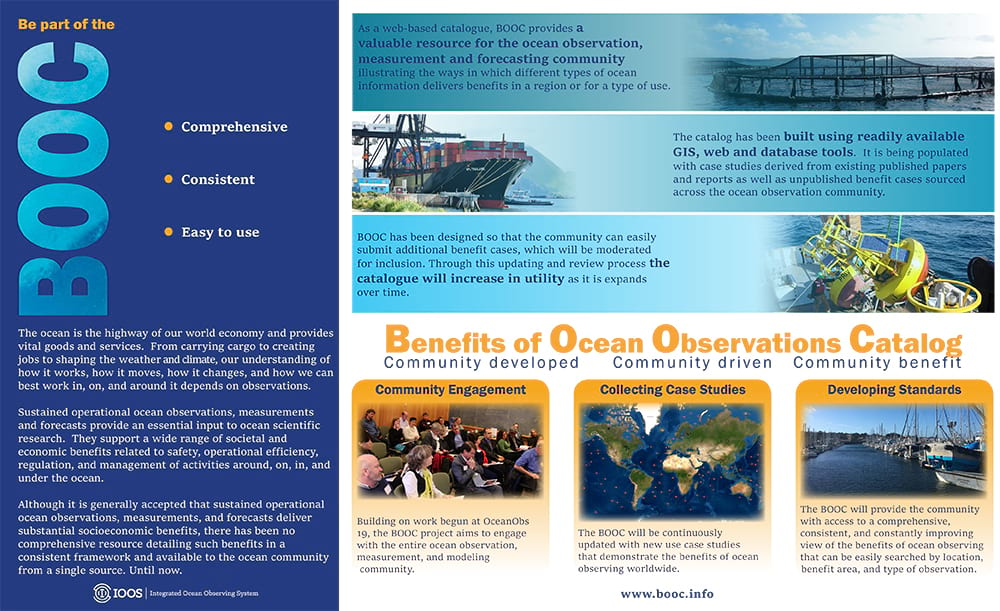Benefits of Ocean Observations Catalog Work Packages
WP1 Community Engagement
To be an effective tool, BOOC will need the support of all parts of the ocean observing community. This Work Package will build on the work already undertaken through OceanObs 19 to seek the engagement of the community and their contributions to the development of BOOC.
WP2 Collecting Use Case Studies
Readily accessible existing use case studies that demonstrate the benefits of ocean observing will be collected.
WP3 Developing Standards for Use Case Studies
Once a suitable collection of existing use cases has been compiled, these will be reviewed to determine a small number of standardized formats suitable for inclusion in BOOC. Relevant metadata properties to consider for standardization include economic and/or societal benefit type, robustness of qualitative analysis, geographic extent, the ocean observation parameters used etc, with an overarching goal of being able to search the catalogue based on defined search keys and/or geographical areas.
WP4 Standardizing Use Case Studies
Once metadata standards and a taxonomy have been defined, the initial collection of use cases will be adjusted to standardized formats. Consideration will be given to what report outputs are likely to be required by the ocean observation community.
WP5 Update and Addition Workflow
This Work Package will develop a workflow for addition of new case studies, describing how they will be moderated, reviewed and translated into the standard formats.
WP6 Prototype Development
Based on the metadata standards, taxonomy and study addition workflow a BOOC prototype will be developed as a repository for the initial collection of use cases.
WP7 Soliciting Additional Use Cases
To develop the utility and value of BOOC, additional use cases will be solicited from across the ocean observation community. This Work Package will develop the community outreach needed to ensure that BOOC accumulates all existing use cases and is considered as a repository for all new use cases.
WP8 Prototype Testing
As additional use cases are submitted, BOOC may need to be adjusted or modified to accommodate these. This Work Package will allow for the prototype to be tested for operation and functionality.
WP9 Reviewing Submissions
Standards for use case review will need to be established, making use of some form of peer review process. This process would ensure future submissions are of an appropriate standard prior to them being incorporated into BOOC. Ways of automating this process will be considered.
WP10 Governance and Operation
In order to be a sustainable tool to support the long-term needs of the ocean observation community, BOOC will require appropriate community governance mechanisms and long-term resourcing for its operation. This Work Package will develop a model for community involvement, governance and support to ensure the long-term sustainability and value of BOOC, including consideration of where it is hosted and how sufficient resources can be allocated to its long-term operation.
The BOOC team welcomes feedback from the community
BOOC is designed to benefit the entire ocean observing community by providing an avenue for communicating the socioeconomic and ecological impacts of ocean observations. If you are interested in any of the activities listed below, please use the dialogue box to select which activities you would like to learn more about.
Test
A beta version of the web tool exists and we invite community members outside of NOAA to test it.
Submit
We currently have a few use cases in the web tool and are inviting the community to submit new ones for review. Please see the guidance document on writing a use case (pdf, 469 kb).
Review
The process for reviewing use cases is similar to that of an academic journal where they are assessed by an editor and two reviewers. We invite interested community members to be added to the list of reviewers.
 Official websites use .gov
A .gov website belongs to an official government organization in the United States.
Official websites use .gov
A .gov website belongs to an official government organization in the United States.
 Secure .gov websites use HTTPS
A lock or https:// means you’ve safely connected to the .gov website. Share sensitive information only on official, secure websites.
Secure .gov websites use HTTPS
A lock or https:// means you’ve safely connected to the .gov website. Share sensitive information only on official, secure websites.

